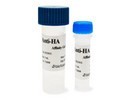
|

| 产地 | 中国/美国 |
| 品牌 | KALANG/进口品牌 |
| 货号 | kl-B058Hu01 |
| 保存条件 | -20℃ |
| CAS编号 | |
| 保质期 | 12个月个月 |
胱天蛋白酶激活脱氧核糖核酸酶(CAD)重组蛋白
Recombinant Caspase Activated DNase (CAD)
FOR IN VITRO AND RESEARCH USE ONLY, NOT FOR USE IN CLINICAL DIAGNOSTIC PROCEDURES!
| Organism species | Homo sapiens (Human) |
| Product No. | |
| Source | Prokaryotic expression |
| Host | E.coli |
| Purity | > 95% |
| UOM | 50ug |
| Predicted Molecular Mass | 31.9kDa |
| Concentration | 8.4 |
| Applications | SDS-PAGE; WB; ELISA; IP. |
| Endotoxin Level | <1.0EU per 1μg (determined by the LAL method) |
| Residues | Arg87~Lys323 (Accession # O76075) with two N-terminal Tags, His-tag and T7-tag |

| Formulation | Supplied as lyophilized form in PBS, pH7.4, containing 5% trehalose, 0.01% sarcosyl. |
胱天蛋白酶激活脱氧核糖核酸酶(CAD)重组蛋白SEQUENCES
The sequence of the target protein is listed below.
MGSSHHHHHH SSGLVPRGSH MASMTGGQQM GRGSEFELRR Q- RFLS AFHEPQVGLI QAAQQLLCDE QAPQRQRLLA DLLHNVSQNI AAETRAEDPP WFEGLESRFQ SKSGYLRYSC ESRIRSYLRE VSSYPSTVGA EAQEEFLRVL GSMCQRLRSM QYNGSYFDRG AKGGSRLCTP EGWFSCQGPF DMDSCLSRHS INPYSNRESR ILFSTWNLDH IIEKKRTIIP TLVEAIKEQD GREVDWEYFY GLLFTSENLK LVHIVCHKKT THKLNCDPSR IYK
USAGE
Reconstitute in sterile ddH2O.
胱天蛋白酶激活脱氧核糖核酸酶(CAD)重组蛋白STORAGE AND STABILITY
Storage: Avoid repeated freeze/thaw cycles. Store at 2-8oC for one month. Aliquot and store at -80oC for 12 months.
Stability Test: The thermal stability is described by the loss rate of the target protein. The loss rate was determined by accelerated thermal degradation test, that is, incubate the protein at 37oC for 48h, and no obvious degradation and precipitation were observed. (Referring from China Biological Products Standard, which was calculated by the Arrhenius equation.) The loss of this protein is less than 5% within the expiration date under appropriate storage condition.
胱天蛋白酶激活脱氧核糖核酸酶(CAD)重组蛋白About the MARKER (complimentary)
Effective Size Range: 10kDa to 70kDa.
Protein bands: 10kDa, 14kDa, 18kDa, 22kDa, 26kDa, 33kDa, 44kDa and 70kDa.
Double intensity bands: The 26kDa, 18kDa, 10kDa bands are at double intensity to make location and size approximation of proteins of interest quick and easy.
Ready-to-use: No need to heat, dilute or add reducing agents before use.
KL129Ga01 组织金属蛋白酶抑制因子3(TIMP3)重组蛋白 Recombinant Tissue Inhibitors Of Metalloproteinase 3 (TIMP3) Chicken (Gallus)
KL129Hu01 组织金属蛋白酶抑制因子3(TIMP3)重组蛋白 Recombinant Tissue Inhibitors Of Metalloproteinase 3 (TIMP3) Homo sapiens (Human)
KL129Mu01 组织金属蛋白酶抑制因子3(TIMP3)重组蛋白 Recombinant Tissue Inhibitors Of Metalloproteinase 3 (TIMP3) Mus musculus (Mouse)
KL129Po01 组织金属蛋白酶抑制因子3(TIMP3)重组蛋白 Recombinant Tissue Inhibitors Of Metalloproteinase 3 (TIMP3) Sus scrofa; Porcine (Pig)
KL129Ra01 组织金属蛋白酶抑制因子3(TIMP3)重组蛋白 Recombinant Tissue Inhibitors Of Metalloproteinase 3 (TIMP3) Rattus norvegicus (Rat)
KL129Rb01 组织金属蛋白酶抑制因子3(TIMP3)重组蛋白 Recombinant Tissue Inhibitors Of Metalloproteinase 3 (TIMP3) Oryctolagus cuniculus (Rabbit)
KL129Si01 组织金属蛋白酶抑制因子3(TIMP3)重组蛋白 Recombinant Tissue Inhibitors Of Metalloproteinase 3 (TIMP3) Rhesus monkey (Simian)
KL130Bo01 组织金属蛋白酶抑制因子4(TIMP4)重组蛋白 Recombinant Tissue Inhibitors Of Metalloproteinase 4 (TIMP4) Bos taurus; Bovine (Cattle)
KL130Hu01 组织金属蛋白酶抑制因子4(TIMP4)重组蛋白 Recombinant Tissue Inhibitors Of Metalloproteinase 4 (TIMP4) Homo sapiens (Human)
KL130Mu01 组织金属蛋白酶抑制因子4(TIMP4)重组蛋白 Recombinant Tissue Inhibitors Of Metalloproteinase 4 (TIMP4) Mus musculus (Mouse)
KL130Po01 组织金属蛋白酶抑制因子4(TIMP4)重组蛋白 Recombinant Tissue Inhibitors Of Metalloproteinase 4 (TIMP4) Sus scrofa; Porcine (Pig)
KL130Ra01 组织金属蛋白酶抑制因子4(TIMP4)重组蛋白 Recombinant Tissue Inhibitors Of Metalloproteinase 4 (TIMP4) Rattus norvegicus (Rat)
KL130Rb01 组织金属蛋白酶抑制因子4(TIMP4)重组蛋白 Recombinant Tissue Inhibitors Of Metalloproteinase 4 (TIMP4) Oryctolagus cuniculus (Rabbit)
KL131Bo01 转化生长因子β诱导蛋白(TGFβI)重组蛋白 Recombinant Transforming Growth Factor Beta Induced Protein (TGFbI) Bos taurus; Bovine (Cattle)
KL131Fi01 转化生长因子β诱导蛋白(TGFβI)重组蛋白 Recombinant Transforming Growth Factor Beta Induced Protein (TGFbI) Danio rerio (Zebrafish)
KL131Hu01 转化生长因子β诱导蛋白(TGFβI)重组蛋白 Recombinant Transforming Growth Factor Beta Induced Protein (TGFbI) Homo sapiens (Human)